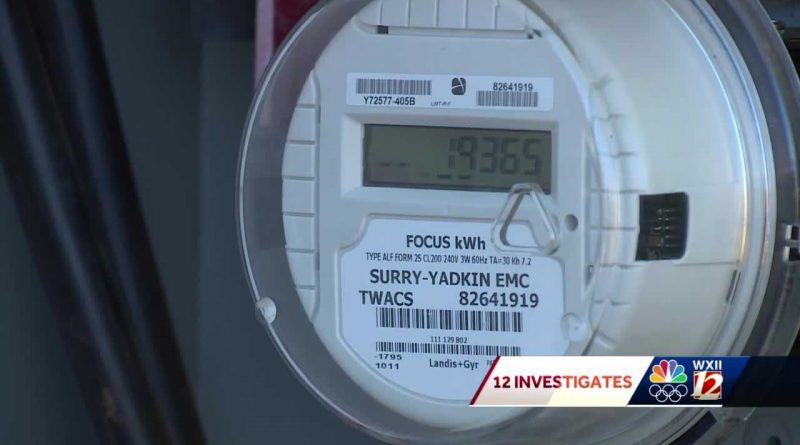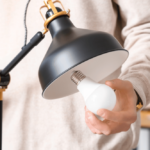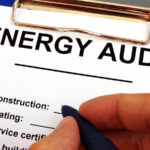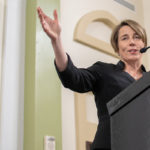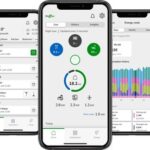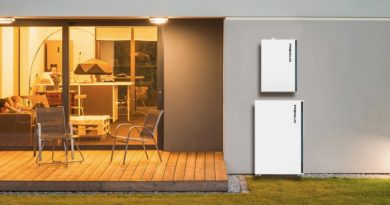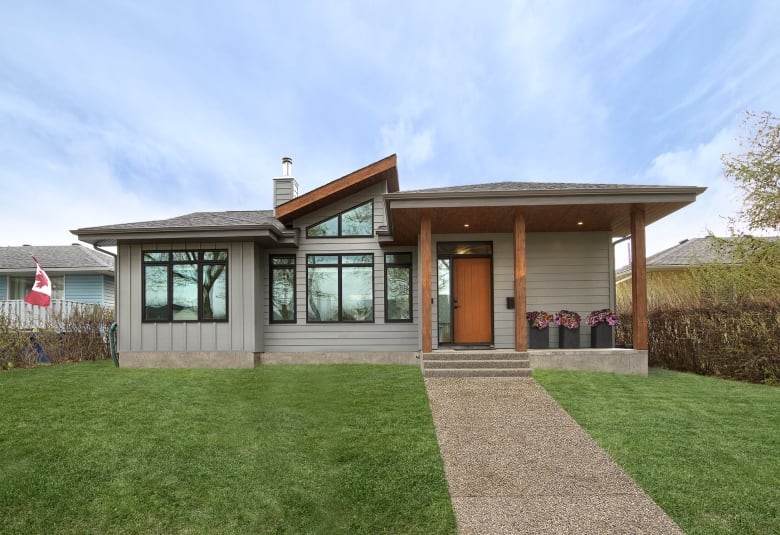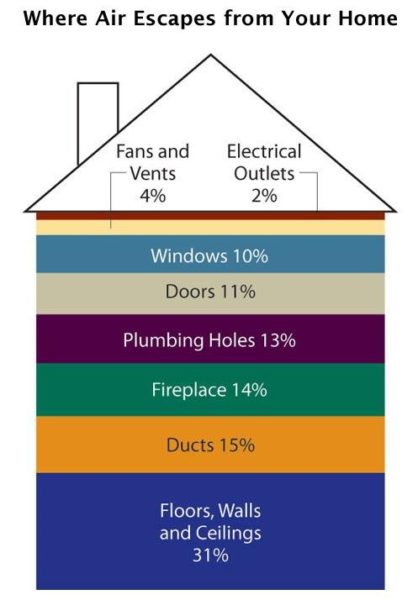Surry-Yadkin Electric co-op responds to rise in member complaints, invites WXII on home energy audit – WXII12 Winston-Salem
Energy Disrupter

Many people have spoken out concerned about a spike in their power bills, confusion over their usage and overall concern over the Surry-Yadkin Electric Membership Corporation. At the height of cold temperatures in the beginning of the year, power bills skyrocketed for many. That’s when SYEMC members first reached out to WXII 12 with a plea for help. Click here for previous coverage. Wendy Wood, SYEMC Manager of Communications & Community Relations, has assured WXII 12 they are looking into each member’s account and investigating complaints as they are brought to their attention. Wood said the outside temperature is the greatest factor in home energy use, with an average of 46% of total use attributed to electric heat source and power bills are based on individual use. WXII 12’s Audrey Biesk was invited by SYEMC to go on a home energy audit to show opportunities for energy efficiency at home.Many members are still concerned and over the last few months have gotten together and created a Facebook group, SYEMC Failures, that now has 1800 members.Some comments from different people read:“I’m having to put off or shuffle bills around just to try and keep the power on each month.” “I’m having to cancel doctor appointments and not order prescriptions to pay the power bill instead.” “I don’t cook, my heat stays on 68 and my bill keeps getting higher and higher. We replaced our heat pump three years ago, water heater has been replaced and I replaced every appliance in the kitchen. Something has to give. My bill has never been this high.”“I had to cut my grocery budget each week for our family of 7 to pay our power” Several people wondered how exactly their smart meters are read. A SYEMC employee said the meter does not use cell or satellite reception. The meter is read through power lines and then sent to the substation and network. The smart meters were installed across the board for SYEMC members back in 2012 to offer pre-paid options and to track account usage hour by hour through the smart hub app online. SYEMC offers these energy saving tips to members to help lower power use and cost:Reduce the amount of air leaking in and out of your home by caulking and weatherstripping around door and window frames. Install a programmable thermostat to control the temperature in your home more efficiently and maintain comfort. Set the thermostat as low as comfortable in the winter and lower the set point when you’re sleeping or away from home. Save up to 10% a year by setting your thermostat seven to 10 degrees lower for eight hours a day in the winter. Clean or replace air filters once a month or as recommended for your unit. Clean warm-air registers, baseboard heaters and radiators as needed, and make sure they are not blocked by furniture, carpeting or drapes. Turn off kitchen, bath and other exhaust fans within 20 minutes after you are done cooking or bathing; when replacing exhaust fans, consider installing high-efficiency low-noise models. During winter, keep the draperies and shades on your south-facing windows open during the day to allow the sunlight to enter your home and closed at night to reduce the chill you may feel from cold windows. Windows – especially inefficient windows – account for a large proportion of the heat that escapes from your home as warm air is lost to the cold glass. One cheaper way to reduce heat loss is to install window film. It resembles plastic wrap and helps retain heat, and can be purchased at some home improvement stores. Check your dryer vent to be sure it is not blocked. This will save energy and may prevent a fire. Replace door bottoms and thresholds with ones that have pliable sealing gaskets. Enjoy the fireplace, but when you are not using it, keep the fireplace flue damper tightly closed because an open damper creates a draft, pulling air from the room sending heat up the chimney. Cover single-pane windows with storm windows or replace them with more efficient double-pane low-emissivity windows. Hot water is a big energy user. The U.S. Department of Energy recommends keeping your water heater’s thermostat set at 120 degrees. Every 10-degree reduction in your water heater’s thermostat can shave 3% to 5% off your bill. Even if your attic is insulated, it’s easy to overlook the attic door. Add a layer of insulation to the inside of the door to prevent expensively heated air from rising into the attic.Because of the increase in complaints, the co-op hired B & R Services, a certified home energy auditor to conduct interior and exterior home inspections to investigate where an increase in energy use could be coming from. Kevin Bauguess, Senior BPI Building Analyst tells WXII 12 weatherization includes an in-depth look at crawl spaces, the attic, doors, windows, registers, duct work, a blower door test to discover any air leaks, as well as checking the condition of heating and cooling units.Bauguess said air sealing is the number one priority to ensure the HVAC is delivering air where a homeowner wants it. At a home in Dobson, he asked the homeowner if any rooms have any comfort issues or hot or cold spots and determined where the issue could be coming from. He said these are things an electrician won’t do, which is what many members questioned. “A typical house in this area you have part of a house was built in 1950 and the other part is added in a century, and back in the ’50’s they were certainly not focused on energy efficiency when they were building the house, so we come and tighten that up and you’ll see a big difference,” Bauguess stated. A comprehensive energy audit also includes an imaging tool to help identify air leaks in recess lighting, for example from an attic. Something a homeowner may not think about that could cause a power bill to go up. According to the U.S. department of Energy, the latest data from North Carolina utilities in 2019 shows Surry-Yadkin Electric had the highest average price in cents per kilowatt-hour of all co-ops in the state. Co-ops are not regulated by the state utilities commission, so WXII 12 reached out to the North Carolina Rural Electrification Authority. When asked how many complaints regarding SYEMC have been received, Frances Liles said, “For the period Jan. 1, 2021, through Feb. 1, 2021, my office has received a total of six complaints from the SYEMC members.”In response to any faulty equipment ever reported, Liles said, “There has not been any record of faulty equipment reported to my office but we are not informed of equipment issues that any of the cooperatives may have unless there was an issue with equipment that caused a major outage.”Several SYEMC members asked WXII 12 about the use of capital credits. Wood explained that members must invest in their cooperative. She said, “The equity built within the cooperative is used for leverage to finance large projects that are necessary to upgrade the system to improve system reliability and provide electric service to our members… If financial conditions allow, the board of directors will pay out (or retire) the capital credits to members. Having strong and healthy financial ratios is important to continue the well-being of the cooperative and must be present before retiring member’s equity.”SYEMC retires capital credits back to its members using the FIFO method, which is first in first out. Wood stated, “The first ones on our system will be the first ones to be paid out. Once a year, the board will vote to retire the oldest year(s) or a portion of year(s) as a general retirement based on financial conditions. For example, the capital credits from 1994 were retired across two years, 2019 and 2020. We have had years when we’ve been able to retire more than one year. The general retirement typically occurs prior to the annual meeting held in October each year.”Wood also stated SYEMC has not had a rate increase since January of 2018.When asked if the solar farm is providing any power or money for the company Wood said, “Our solar farm in the Fairview community of Surry County is operational. It is part of our Senate Bill 3 mandate, which requires utility companies to meet certain standards for renewable energy. In 2019, the most recent year for which we have a full report, the Fairview Solar Farm produced more than 289,500 kilowatt-hours of electricity into Surry-Yadkin EMC’s power grid.”Wood tells WXII 12 that SYEMC members can learn more about organizations that provide assistance in paying bills here. Or SYEMC has information on DSS’s Crisis Intervention Program and Low Income Home Energy Assistance Program here. Wood said the HOPE program is funding approved through the state to assist with COVID utility and rent payments for which members will be able to apply. Click here for the link to learn more information or to apply.Wood also encourages members to reach out through email or direct office line (336-356-5259) with their questions and concerns to address those on a one-on-one basis.If members are interested, SYEMC is offering a free in house energy assessment through member support and if people still have concerns then they can request a comprehensive audit also free of charge as part of a pilot program.
Many people have spoken out concerned about a spike in their power bills, confusion over their usage and overall concern over the Surry-Yadkin Electric Membership Corporation.
At the height of cold temperatures in the beginning of the year, power bills skyrocketed for many. That’s when SYEMC members first reached out to WXII 12 with a plea for help. Click here for previous coverage.
Advertisement
Wendy Wood, SYEMC Manager of Communications & Community Relations, has assured WXII 12 they are looking into each member’s account and investigating complaints as they are brought to their attention.
Wood said the outside temperature is the greatest factor in home energy use, with an average of 46% of total use attributed to electric heat source and power bills are based on individual use.
WXII 12’s Audrey Biesk was invited by SYEMC to go on a home energy audit to show opportunities for energy efficiency at home.
Many members are still concerned and over the last few months have gotten together and created a Facebook group, SYEMC Failures, that now has 1800 members.
Some comments from different people read:
“I’m having to put off or shuffle bills around just to try and keep the power on each month.”
“I’m having to cancel doctor appointments and not order prescriptions to pay the power bill instead.”
“I don’t cook, my heat stays on 68 and my bill keeps getting higher and higher. We replaced our heat pump three years ago, water heater has been replaced and I replaced every appliance in the kitchen. Something has to give. My bill has never been this high.”
“I had to cut my grocery budget each week for our family of 7 to pay our power”
Several people wondered how exactly their smart meters are read. A SYEMC employee said the meter does not use cell or satellite reception. The meter is read through power lines and then sent to the substation and network. The smart meters were installed across the board for SYEMC members back in 2012 to offer pre-paid options and to track account usage hour by hour through the smart hub app online.
SYEMC offers these energy saving tips to members to help lower power use and cost:
- Reduce the amount of air leaking in and out of your home by caulking and weatherstripping around door and window frames.
- Install a programmable thermostat to control the temperature in your home more efficiently and maintain comfort. Set the thermostat as low as comfortable in the winter and lower the set point when you’re sleeping or away from home.
- Save up to 10% a year by setting your thermostat seven to 10 degrees lower for eight hours a day in the winter.
- Clean or replace air filters once a month or as recommended for your unit.
- Clean warm-air registers, baseboard heaters and radiators as needed, and make sure they are not blocked by furniture, carpeting or drapes.
- Turn off kitchen, bath and other exhaust fans within 20 minutes after you are done cooking or bathing; when replacing exhaust fans, consider installing high-efficiency low-noise models.
- During winter, keep the draperies and shades on your south-facing windows open during the day to allow the sunlight to enter your home and closed at night to reduce the chill you may feel from cold windows.
- Windows – especially inefficient windows – account for a large proportion of the heat that escapes from your home as warm air is lost to the cold glass. One cheaper way to reduce heat loss is to install window film. It resembles plastic wrap and helps retain heat, and can be purchased at some home improvement stores.
- Check your dryer vent to be sure it is not blocked. This will save energy and may prevent a fire.
- Replace door bottoms and thresholds with ones that have pliable sealing gaskets.
- Enjoy the fireplace, but when you are not using it, keep the fireplace flue damper tightly closed because an open damper creates a draft, pulling air from the room sending heat up the chimney.
- Cover single-pane windows with storm windows or replace them with more efficient double-pane low-emissivity windows.
- Hot water is a big energy user. The U.S. Department of Energy recommends keeping your water heater’s thermostat set at 120 degrees. Every 10-degree reduction in your water heater’s thermostat can shave 3% to 5% off your bill.
- Even if your attic is insulated, it’s easy to overlook the attic door. Add a layer of insulation to the inside of the door to prevent expensively heated air from rising into the attic.
Because of the increase in complaints, the co-op hired B & R Services, a certified home energy auditor to conduct interior and exterior home inspections to investigate where an increase in energy use could be coming from.
Kevin Bauguess, Senior BPI Building Analyst tells WXII 12 weatherization includes an in-depth look at crawl spaces, the attic, doors, windows, registers, duct work, a blower door test to discover any air leaks, as well as checking the condition of heating and cooling units.
Bauguess said air sealing is the number one priority to ensure the HVAC is delivering air where a homeowner wants it. At a home in Dobson, he asked the homeowner if any rooms have any comfort issues or hot or cold spots and determined where the issue could be coming from. He said these are things an electrician won’t do, which is what many members questioned.
“A typical house in this area you have part of a house was built in 1950 and the other part is added in a century, and back in the ’50’s they were certainly not focused on energy efficiency when they were building the house, so we come and tighten that up and you’ll see a big difference,” Bauguess stated.
A comprehensive energy audit also includes an imaging tool to help identify air leaks in recess lighting, for example from an attic. Something a homeowner may not think about that could cause a power bill to go up.
According to the U.S. department of Energy, the latest data from North Carolina utilities in 2019 shows Surry-Yadkin Electric had the highest average price in cents per kilowatt-hour of all co-ops in the state. Co-ops are not regulated by the state utilities commission, so WXII 12 reached out to the North Carolina Rural Electrification Authority.
When asked how many complaints regarding SYEMC have been received, Frances Liles said, “For the period Jan. 1, 2021, through Feb. 1, 2021, my office has received a total of six complaints from the SYEMC members.”
In response to any faulty equipment ever reported, Liles said, “There has not been any record of faulty equipment reported to my office but we are not informed of equipment issues that any of the cooperatives may have unless there was an issue with equipment that caused a major outage.”
Several SYEMC members asked WXII 12 about the use of capital credits. Wood explained that members must invest in their cooperative. She said, “The equity built within the cooperative is used for leverage to finance large projects that are necessary to upgrade the system to improve system reliability and provide electric service to our members… If financial conditions allow, the board of directors will pay out (or retire) the capital credits to members. Having strong and healthy financial ratios is important to continue the well-being of the cooperative and must be present before retiring member’s equity.”
SYEMC retires capital credits back to its members using the FIFO method, which is first in first out. Wood stated, “The first ones on our system will be the first ones to be paid out. Once a year, the board will vote to retire the oldest year(s) or a portion of year(s) as a general retirement based on financial conditions. For example, the capital credits from 1994 were retired across two years, 2019 and 2020. We have had years when we’ve been able to retire more than one year. The general retirement typically occurs prior to the annual meeting held in October each year.”
Wood also stated SYEMC has not had a rate increase since January of 2018.
When asked if the solar farm is providing any power or money for the company Wood said, “Our solar farm in the Fairview community of Surry County is operational. It is part of our Senate Bill 3 mandate, which requires utility companies to meet certain standards for renewable energy. In 2019, the most recent year for which we have a full report, the Fairview Solar Farm produced more than 289,500 kilowatt-hours of electricity into Surry-Yadkin EMC’s power grid.”
Wood tells WXII 12 that SYEMC members can learn more about organizations that provide assistance in paying bills here. Or SYEMC has information on DSS’s Crisis Intervention Program and Low Income Home Energy Assistance Program here. Wood said the HOPE program is funding approved through the state to assist with COVID utility and rent payments for which members will be able to apply. Click here for the link to learn more information or to apply.
Wood also encourages members to reach out through email or direct office line (336-356-5259) with their questions and concerns to address those on a one-on-one basis.
If members are interested, SYEMC is offering a free in house energy assessment through member support and if people still have concerns then they can request a comprehensive audit also free of charge as part of a pilot program.
Original Source: https://www.wxii12.com/article/surry-yadkin-electric-co-op-complaints-home-energy/35901871

